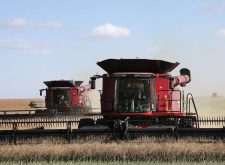By Rod Nickel
WINNIPEG, Manitoba, Aug 18 (Reuters) – Hot, dry summer weather across the southern Canadian Prairies is likely to sharply shrink the wheat harvest, but canola output looks more promising, according to a Reuters survey of 17 traders and analysts.
All-wheat output is likely to dive 17 percent to 26.2 million tonnes, according to the average estimate, the smallest crop in six years.
Canola production may edge one percent higher from last year to a record 18.6 million tonnes in the world’s biggest grower of the oilseed, traders and analysts said on average.
Read Also

B.C. ostriches culled, CFIA confirms
Ostriches on an embattled Edgewood, B.C. farm have been culled after a prolonged legal battle, the Canadian Food Inspection Agency has confirmed.
The Canadian Prairies received an unusually varied patchwork of weather this growing season, including soggy weather in parts of Alberta and Saskatchewan and a favorable combination of heat and timely rains in other areas. Trade estimates range widely for wheat and canola production.
Hot, dry weather likely damaged canola, spring wheat and durum grown in a narrow band north of the U.S. border, said Jerry Klassen, manager of GAP SA Grains and Produits in Winnipeg. Robust crops in other areas balanced some of those losses, he said.
“It’s not a disaster, but it’s not what we’re used to seeing the last four to five years,” he said, referring to some of the biggest harvests ever.
Much of the Prairies, where most of Canada’s wheat and canola grows, has received less than 60 percent of normal precipitation during the past 60 days, according to Agriculture and Agri-Food Canada.
Even so, crops have proven resilient before.
“As has become the norm, less than ideal growing conditions don’t translate to low (canola) production numbers given today’s crop science,” said Tony Tryhuk, manager of commodity trading at RBC Dominion Securities. Harvesting is running well ahead of schedule, limiting the risk of damage to immature plants from frost, Klassen said. Statscan surveyed farmers from July 19 through Aug. 1.














